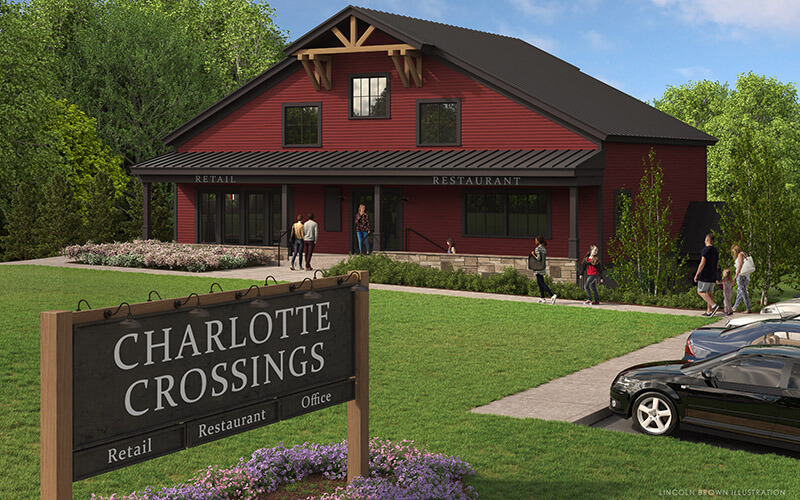A restaurant in town, finally

When Debbie Kassabian and her husband, Michael Dunbar, first moved to Charlotte, Kassabian said they woke up in the morning and said, “Let’s go out to breakfast,” and there wasn’t a restaurant in town to go to breakfast…or lunch…or dinner. The couple decided to take care of that problem, and, when the opportunity arose to purchase the former Vermont Wildflower Farm property, they jumped at the chance.
After two years and four meetings with town planning and zoning, they have finally begun construction on what they hope will be a popular hangout spot for local diners. The property is also zoned for retail and office space.
Dunbar and Kassabian purchased the property in December of 2016 through their company Gemini Properties. Their original intent was to use the existing structure, which had served most recently as a storage facility for a wildflower seed company, and renovate the building. Once they began renovation plans, however, they ran into several structural and construction issues, including a significant rat infestation due to the storage of seeds and bulbs in the building. After site visits, Dunbar said, Zoning Administrator Aaron Brown figured out that Dunbar and Kassabian could actually tear down the building and build from scratch as long as they kept the same footprint.
In December of 2018, after approaching Charlotte Volunteer Fire and Rescue to coordinate a controlled burn and training exercise at the site, the old structure was demolished and the construction process began. Dunbar, who owns Middlebury Fence Company, also owns Renovate, which he said he started to keep his staff working year-round. He anticipates construction will be complete in June.
Kassabian said she and Dunbar have no interest in owning or operating a retail store or restaurant, and that their plan is to lease space to others. They already have a restaurant plan in place, which was approved and permitted with the town. Barbara Cote, chef and owner of the Shelburne Tap House in Shelburne, is committed to opening a restaurant space in the ground floor of the new building, which will be called Charlotte Crossing. The new restaurant is going with a working title of Charlotte Tap House, and Cote is currently seeking funding from private investors in order to finance the project.
The restaurant will include indoor and outdoor seating as well as a sizable bar, and is allowed a total of 30 seats and is approximately 2500 square feet. It will include table service as well as takeout and delivery menus—a feature that is currently absent in most of Charlotte.
Kassabian said she and Dunbar worked with architect Anna Thelemark from Burlington firm Struktur, Charlie Proutt from Distinctive Landscaping in Charlotte, and Artisan Engineering to complete the project. Dunbar said they hope to make the space comfortable and family friendly. “We want something local, where local people can go,” he said. “We want to create this space where people can cross paths with their neighbors.”
Those paths are literal as well as figurative; there are currently walking paths on the 5.5-acre property that Kassabian said they plan to maintain. The property is close to the underpass of the Town Link Trail that goes under Route 7, and Kassabian hopes to connect with the committee overseeing that plan to see if they can work together to make that land part of the public trail.
The retail space in the building is currently unplanned, and the couple is looking for interested parties who want to open a business there; permitting is already in place. Dunbar said there is potential there for a convenience store or market or even a Vermont state liquor store. There will also be second-story office space available for up to ten people.
Dunbar said when he first discussed his plans with friends, “Everybody that I told said I was dumb. They said, ‘You shouldn’t do that in Charlotte.’” After a recent shutdown of plans for a Maplefields convenience store farther up the road, the potential for hurdles was high. Luckily, the space already came with the proper permits in place, and it was just a matter, he said, of being well prepared when they presented to planning and zoning committees. Those people, he said, “were great. They were excited.”
Dunbar said, “We are commercial development rookies and have learned the process along the way. I think this is the reason why it went so well. We didn’t come to the table pushing something that people in town didn’t want. We came forward with a rough idea, took input and tweaked things to make the project better for everyone. We are so excited to work with fellow Charlottians to bring our vision to life.”
